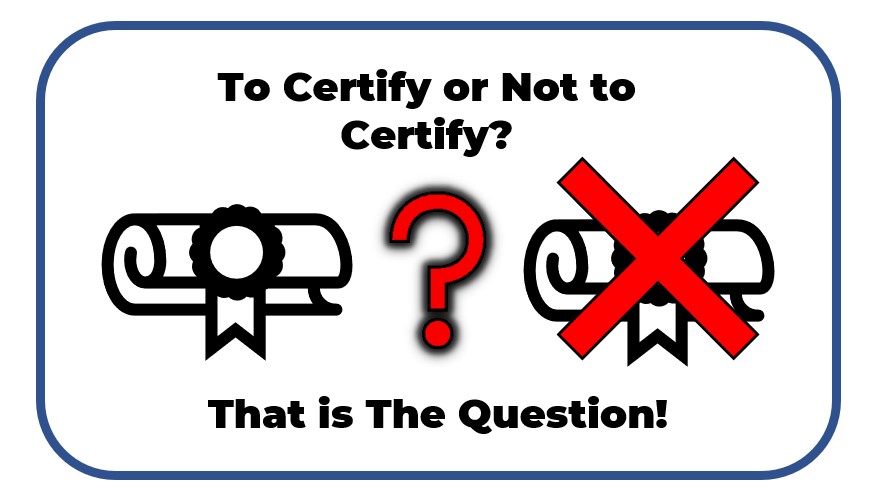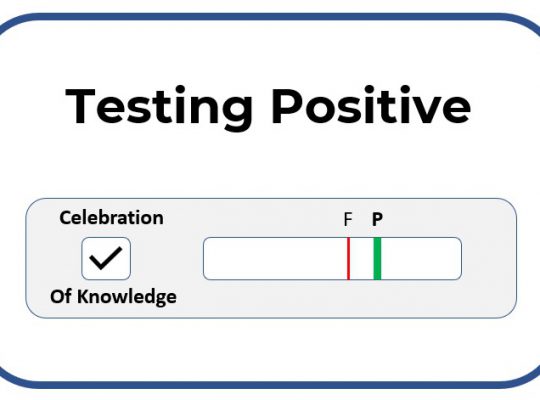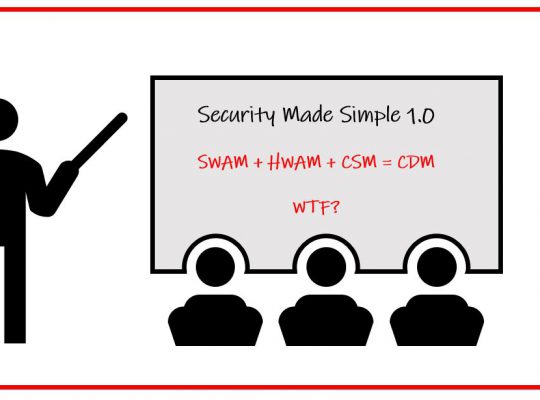Disclaimer:
Before reading this blog – it is very important to point out that I work for one of the best training companies in the UK (and elsewhere in Europe) who deliver training courses under the unique selling point of – “Immerse, Accelerate and Measure”.
https://firebrand.training/uk/who-are-firebrand
In this context the ‘Measure’ comes in the form that nearly all courses we deliver have some form of certification attached to it. That’s because it’s important to a lot of people to be trained and certified to show that training has taken place and that they have met the standard required to pass the final exam.
In addition to the commercial side of the company – we also deliver a world class apprenticeship program which results in the delegates being ‘certified’ at the appropriate level upon completion. Our packages however also include internationally recognised and vendor specific qualifications and certifications across the track and although they are not required for the apprenticeship qualification – they add extra value to the journey.
I am a big believer in the fact that being certified is an important part of training and dare I say it – it’s an important part of life.
From an early age in our educational development we strive to be certified.
Scouts and Brownie Badges, GCSE’s, A Levels, Diplomas, Degrees and Apprenticeships are what we aim for. The reason being that with proof of education and training you can get a chance at a job or advance your career – which is a fact.
However, like all things in life – it’s never that straight forward.
Leaving education and getting a job – you know you still have a lot to learn. ‘On the job’ learning skills where hopefully you can apply the knowledge that you have acquired through your education and previous training. But sometimes you may feel that something you learned at school never applies to what you do at work. However – take a look at one of my previous blogs to read what I think about that.
Transferable Skills – CyberPhil
As we bounce through life we need to be trained and gain skills in all sorts of things. It could be practical skills and/or theoretical knowledge which can be applied to our work but the dedicated training that we undertake must have some form of impact to improve our performance at work. You could argue that good knowledge results in good skills and hence better productivity (in all its forms).
The big word in all of this is – training must have an IMPACT.
In my days in the military – I undertook a whole load of training. This training was designed to give the knowledge and skills to do my job. From basic training to management and leadership training – this gave me the knowledge and skills to enhance my behavioural skills (eg how to communicate, write reports, look after people and when to shoot someone). This was layered in with the more academic and technical training I completed (throughout my career) to do my primary roles.
Every course you did had a test, exam or ‘measure’ involved in it. Most also gave you a piece of paper or updated a record to say that you were certified to an acceptable level to do your job properly. If you didn’t achieve the standard you did the training again if it was possible. In the early days – if you couldn’t achieve the basic standard you were given the option of trying a different trade or shown the door (brutal but necessary).
Even though in some cases – it appeared to be a ‘tick box’ exercise. The tick in the box was important.
Most (not all) courses I undertook in the military had no direct civilian equivalent and even though I was trained up to the yin yang – the only pieces of paper I had was either a tick in a box or attendance certificate. No use to man nor beast in the outside world. However, every training course I did had a huge impact on my job and the way I did it.
Towards the end of my service career I saw the need to get some qualifications which would be recognised on the ‘outside’ to sit alongside my experience and training in the military. I initially went down the Microsoft route (MCP, MCSA, MCSE etc) but also started a BSc on nothing in particular with the OU! (Started with a course on fossils and ended with technology for a sustainable future!)
I understood the need to show my skills and knowledge in a format the people recognised. Upon leaving I also acquired the City and Guilds in Management certifications – as this went some way to show that I could do some of that management stuff also. But to me, at the time this was just another piece of paper.
As luck would have it – I chose well. I did well with the Microsoft stuff, applied my security knowledge, skills and experience and managed to adapt it to the new world of industry.
That was nearly 15 years ago and in that time I have lost count of the number of exams and certifications I have gained. Nearly all of them were relevant to what I was doing or employed on at the time but admittedly some were just for ‘shits and giggles’ to see what it was all about. Don’t get me wrong – I have failed a few in that time too!
I need to be certified now in order to teach the courses I look after. I need to know the course content and level of competency assessed in order to advise on curriculum and courses we deliver. Although this could be a full time job – it is only part of what I do.
But it is part of my job and not simply a badge collecting exercise.
What I do know is that certification as part of the course to a recognised standard is very important. It shows your competency in both knowledge and skills laid out by the vendor or curriculum provider. It gives you every chance to make an impact within your working world and enhance your experience.
Good training also opens your eyes to other opportunities which you would never have known about if you had not been on the course. If you ever finish a course which has had no impact on your working environment – it was not necessarily a bad course and may have been a poor choice by you or bad advice from a third party.
There is some considerable debate on LinkedIn and other platforms regarding the value of certifications. Although the diplomat in me can relate to the argument that certifications don’t really show ‘real world’ competence – I would also argue for the contrary. It all depends upon the course.
The thing that really makes me smile is that the people who make the biggest noise on these sites about how certification doesn’t matter or count – generally have a list of letters after their names and a collection of badges they have earned through their illustrious careers! Go figure.
The key here is how you achieve the certification in the first place.
- Do you simply read a book and take a test?
- Do you attend an instructor led course – who effectively reads the book to you in order for you to take a test?
- Or do you use a training provider who delivers a curriculum which is enriched with value add material and uses the instructor’s experience which can be translated into your working environment to make an impact?
I know which one I would choose.
The second part of training is applying it to a workplace and this is where I fully understand the fact that a piece of paper, badge or certificate doesn’t really help. You can be well trained without a qualification and still apply your learning and do a great job. So the certification is secondary to the impact it has. But is still worth having if you need to prove your level of training to an outside agency or when looking for a new job/career. It may also be an important part of the governance, regulation and compliance you are seeking.
In my opinion the worst argument for not needing certification training comes from the seasoned professionals who have been working in their roles for years without training and have simply learned on the job or read a few books and become the instant expert. I have seen loads of these over the years and quite frankly – they may be good at pulling it off – but that’s all they do.
Just by virtue of the fact that you do the job and nothing goes wrong doesn’t mean that you are doing a great job.
Training at any level opens your eyes to where you could potentially improve and in the long term do a better job and save money. Certification underpins your training but only has value if the training makes an impact.
- Make training and certification part of your professional development plan (regardless of who you work for)
- Choose a certification path which is relevant to your line of business
- Research the curriculum and learning objectives for the certification you choose.
- Research the quality of the end certification (is it a recognised credential?)
- Ask questions of the training provider to ascertain the quality of training being provided
- Participate fully in the training course – ask questions, interact with other course members and give constructive feedback
- Enter into a training course with an open mind – you don’t know everything!
- Spread the knowledge – use your training to impact on others.
Set a goal for 2022 to learn something new and have fun with it – you never know what impact it will have.







